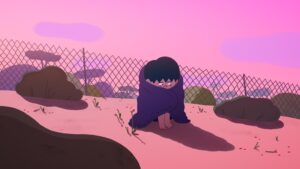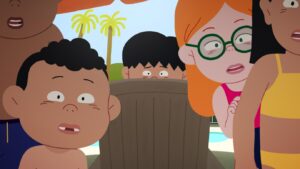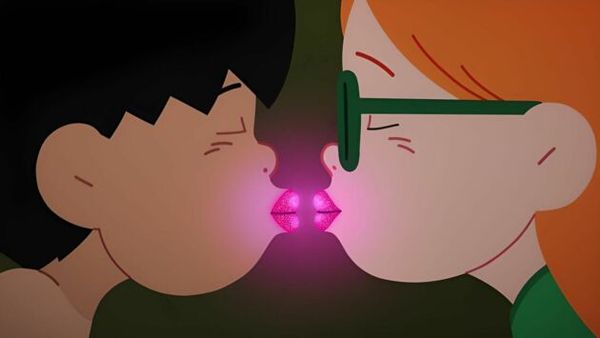Do you remember your first kiss?
While watching Loïc Espuche’s shortlisted animated film, Yuck!, I realized just how many of us go through the same thing when we realize we want to share our first smooch. It’s such a universal experience. Espuche looks at a youthful experience with comedy but never loses sight that once you feel the pangs of your first crush, you will never be the same ever again. It’s a celebration of the unexpected and that butterfly feeling we have all felt floating in our stomachs.
Espuche’s inspiration for this film came from a strange place–the audience watching his previous film. While attending a screening full of kids, they had a very verbal reaction to a kiss between a soldier and his love. Kids do not hold back, and they did not hide their disgust since they were the age where kissing is the worst think could possibly do.
“In the first movie, I didn’t expect that at all, because it was a story of a soldier who goes off to war and the kiss was between him and his fiancé to say goodbye,” Espuche explains. “It was a deep moment in the film and when I heard the reaction, I was so surprised even though I totally understood why they would react like that. After that, in fact, it took me a long time to capture it and put it into a story, because I wanted to be very direct with it, but I wanted the right concept to express that.
Espuche’s film is set at a vacation spot near a water park, and a group of kids spend their time trying to spy on adults who are feeling frisky and loving in the summer sun. Whenever someone is feeling romantic, their lips begin to shimmer with the color pink until their mouth is glowing with romance. For some, it’s an indication or invitation, but, for a young person, it can be embarrassing. Zeroing in on the right shade of pink was a challenge within itself.
 “It was a bit hard to find, because, at the beginning, it was more of an acid pink,” he says. “It was too digital or sensual–too much like a Valentine. I’m not used to using a color a lot by itself. One of the animators, Elie Martens, is also a painter, and he loves color, so I knew he would be really key in us finding the right shade. We asked him to do the color script of the movie, and he submitted something within a month even though were had already started the production. The color of the pink wasn’t just important [for the story] but it was also important that it contrasted with the other colors all around the film. At the end, it’s important to see that it’s light, and our lips are already a little bit pink. We needed to use the color not just by itself but also as light. Elie found that this kind of light is more visible in the shadow, and it was easier to do because it was set during the summer.”
“It was a bit hard to find, because, at the beginning, it was more of an acid pink,” he says. “It was too digital or sensual–too much like a Valentine. I’m not used to using a color a lot by itself. One of the animators, Elie Martens, is also a painter, and he loves color, so I knew he would be really key in us finding the right shade. We asked him to do the color script of the movie, and he submitted something within a month even though were had already started the production. The color of the pink wasn’t just important [for the story] but it was also important that it contrasted with the other colors all around the film. At the end, it’s important to see that it’s light, and our lips are already a little bit pink. We needed to use the color not just by itself but also as light. Elie found that this kind of light is more visible in the shadow, and it was easier to do because it was set during the summer.”
Kids can be cruel, especially when one feels different from the others. I loved how Espuche’s film hints that this group of kids found each other on vacation. Remember when you were on a trip with your family and you connected with kids your age just because you were in the same place at the same time? That lack of real bond makes it easier for kids to make fun of each other. When the rest of the group sees that Léo is curious about kissing, they call him a pervert and point and laugh in his face, and Espuche explains his interest in the gaze from others.
“I didn’t want to specifically look at shame for kids, but I wanted to explore the fear of another person’s gaze,” Espuche says. “I think it was based on the sensation that I had when I was a child and thinking that people would look at me differently. That social pressure from a group. When you at that as an adult you can also see it as a child. When they catch the one boy kissing, they call him a pervert, but, in the end, they are all dreaming of the kissing. It’s such a contradiction. I remember when I was a kid, I remember seeing a kiss in a movie, and I covered my eyes. But then I would peek through [my fingers] to look. I think there is a lot of emotion for both kids and adults. In one moment, we see the two soccer guys, with the Messi and Ronaldo jerseys, and I wanted to represent how even adults feel this even after you grow up. For me, It was about being able to speak about the beginning of feelings and that beginning of desire. We will always fear another person’s gaze no matter what age we are.”
 The music employed throughout Yuck! is dreamy with a synthesized edge. It creeps in and complements the shimmering pink as romance swells, and, Espuche says, that it almost wasn’t included.
The music employed throughout Yuck! is dreamy with a synthesized edge. It creeps in and complements the shimmering pink as romance swells, and, Espuche says, that it almost wasn’t included.
“I wanted something that was dreamy and can tell a love story from a child’s point of view,” he says. “I wanted something with synthesizers since the entire movie was made on a computer. It was difficult to find the sensation of love or something like you can’t control. With the electro music, it’s really easy to target more towards young adults. When you ask composers to to create something about childhood, they often arrive with something like an adult looking at childhood. Not from the childhood’s perspective. We couldn’t find anyone who could do the music and at three months of the end of the movie, we thought it might not have any at all. My producer, Juliette [Marquet] found Aliénor [Dublé] to write the music for this film. Aliénor is an animator, and she did her own music for her own film, and she graduated from the same school that I did. It was the first professional music that Aliénor did, and it was a director match. For three years, we looked, and when we listened to her style, we were sure it was going to be her. If we didn’t succeed, I was going to finish it without music.”
The night reveals everything as Léo heads to bed at the end of a tiring day. He sees that everyone on vacation is dreaming about kissing, and he steps out of his family’s tent. He finds the girl he wants to kiss, and they finally get to share a moment with one another. In a touching, sweet twist, Espuche obscures them from view. We should all have privacy for our first, right?
“During the whole movie, the kids want to see people kiss, and audiences always want to see the big kiss at the end,” he says. “It’s also a way to say that even if you want something to happen, maybe you don’t have to look at it. We can let it exist without being there and watching it for ourselves. Not only are we hiding from the gaze of the other kids but we are hiding from the gaze of the audience.”









